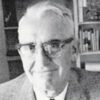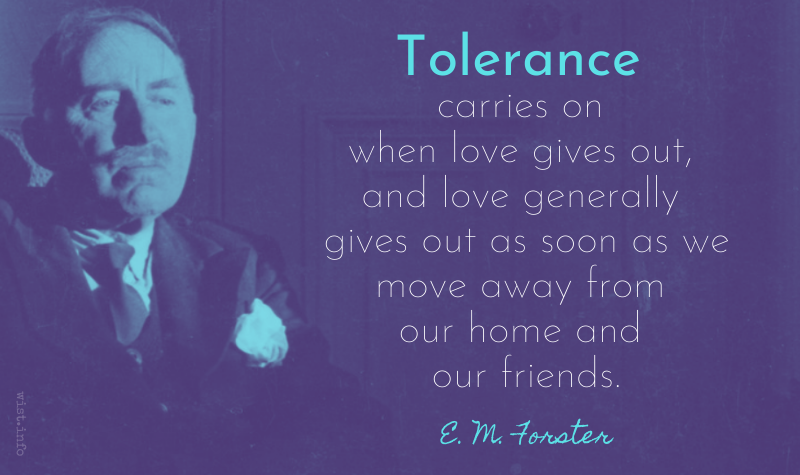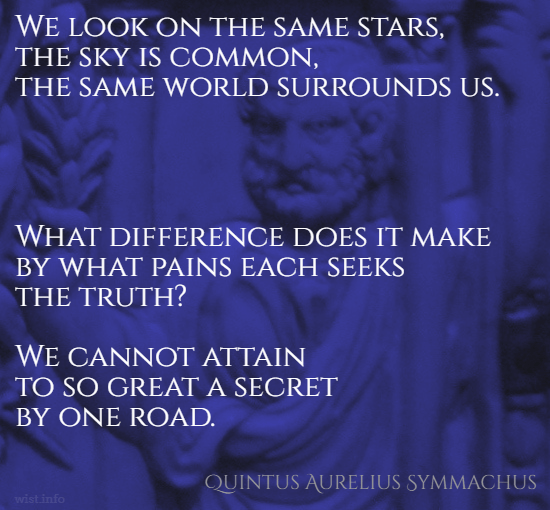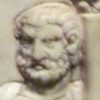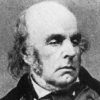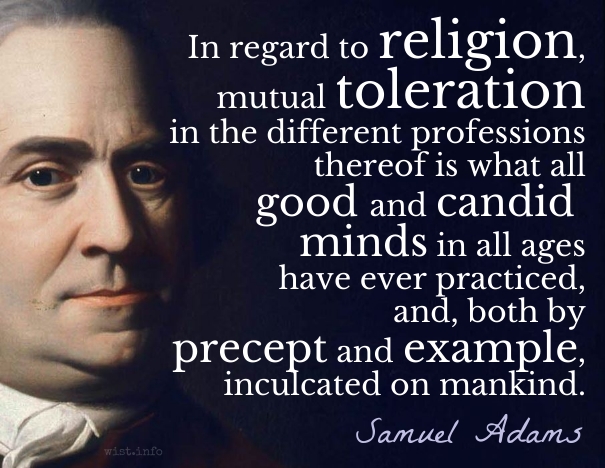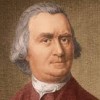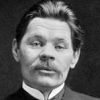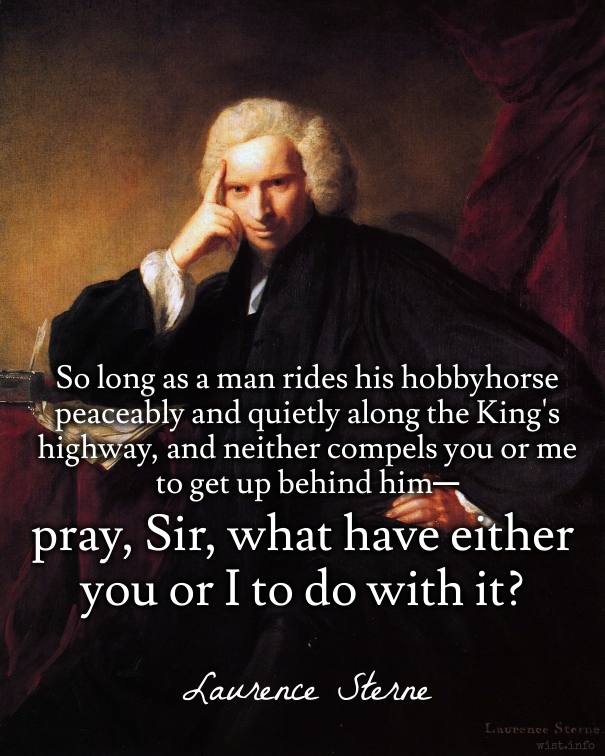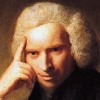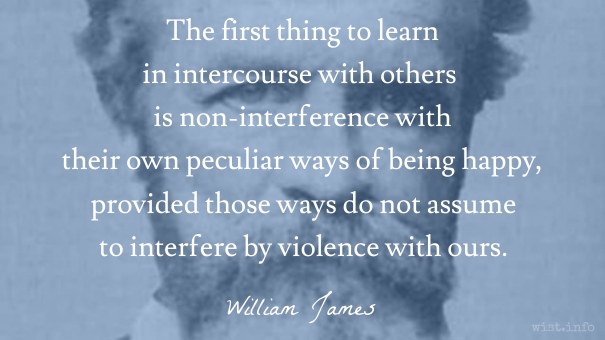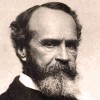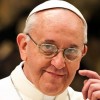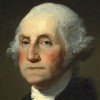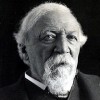I admit that history is filled with religious wars, but let us be careful here, for it is not the multiplicity of religions which has produced these wars, but the spirit of intolerance stirring those who believed themselves to be in a dominant position.
[J’avoue que les histoires sont remplies des guerres de religion : mais, qu’on y prenne bien garde, ce n’est point la multiplicité des religions qui a produit ces guerres, c’est l’esprit d’intolérance, qui animoit celle qui se croyoit la dominante.]
Charles-Lewis de Secondat, Baron de Montesquieu (1689-1755) French political philosopher
Persian Letters [Lettres Persanes], Letter 86, Usbek to Mirza (1721) [tr. Healy (1964), Letter 85]
(Source)
(Source (French)). Alternate translations:
I confess histories are full of religious wars: but do not let us take the thing wrong; it was not the diversity of religious that occasioned these wars; it was the untolerating spirit of that which thought she had the power in her hands.
[tr. Ozell (1760 ed.)]
I acknowledge, that history is full of religious wars: but we must take care to observe, it was not the multiplicity of religions that produced these wars, it was the intolerating spirit which animated that which thought she had the power of governing.
[tr. Floyd (1762), Letter 85]
I acknowledge that history is full of religious wars: but we must distinguish; it is not the multiplicity of religions which has produced wars; it is the intolerant spirit animating that which believed itself in the ascendant.
[tr. Davidson (1891)]
I acknowledge that history is full of religious wars ; but it is an indisputable fact that these wars have not been produced by the multiplicity of religions, but rather by the intolerance of the dominant creed.
[tr. Betts (1897)]
I admit that history is full of wars of religion; but on this point we must be very careful; it is not the multiplicity of religions that produced these wars, but the spirit of intolerance animating the religion that believed itself to be dominant.
[tr. Mauldon (2008), Letter 83]
I admit that history is full of wars of religion. But one must be careful here: these wars were not caused by a multiplicity of religions, but rather by the spirit of intolerance shown by the dominant religion's believers.
[tr. MacKenzie (2014), Letter 85]
Quotations about:
tolerance
Note not all quotations have been tagged, so Search may find additional quotes on this topic.
Not to be able to bear with all bad-tempered people with whom the world is crowded, shows that a man has not a good temper himself: small change is as necessary in business as golden coin.
[Ne pouvoir supporter tous les mauvais caractères dont le monde est plein n’est pas un fort bon caractère: il faut dans le commerce des pièces d’or et de la monnaie.]
Jean de La Bruyère (1645-1696) French essayist, moralist
The Characters [Les Caractères], ch. 5 “Of Society and Conversation [De la Société et de la Conversation],” § 37 (5.37) (1688) [tr. Van Laun (1885)]
(Source)
(Source (French)). Alternate translations:
We must bear with some peoples bad Characters, as we do with bad Money, for the benefit of Commerce.
[Bullord ed. (1696)]
Not to be able to bear with all the bad Characters the World is full of, is no good Character: Copper Mony, for the sake of Commerce, is necessary as well as Gold and Silver.
[Curll ed. (1713)]
We must bear with some Peoples ill Tempers, as we do with Copper Money, for the benefit of Commerce.
[Browne ed. (1752)]
To be unable to endure all the unpleasant characters of whom the world is full is not an admirable characteristic: we need, in our dealings, both gold coins and small change.
[tr. Stewart (1970)]
Hunt out and talk about the good that is in the other fellow’s church, not the bad, and you will do away with all this religious hatred you hear so much of nowadays.
The way to achieve happiness is to have a high standard for yourself and a medium one for everyone else.
Marcelene Cox (1900-1998) American writer, columnist, aphorist
“Ask Any Woman” column, Ladies’ Home Journal (1954-08)
(Source)
Tolerance, I believe, will be imperative after the establishment of peace. It’s always useful to take a concrete instance: and I have been asking myself how I should behave if, after peace was signed, I met Germans who had been fighting against us. I shouldn’t try to love them: I shouldn’t feel inclined. They have broken a window in my little ugly flat for one thing, and they have done other things which I need not specify. But I shall try to tolerate them, because it is common-sense, because in the post-war world we shall have to live with Germans […] not for any lofty reason, but because it is the next thing that will have to be done.
E. M. Forster (1879-1970) English novelist, essayist, critic, librettist [Edward Morgan Forster]
“The Unsung Virtue of Tolerance,” radio broadcast, BBC (Jul 1941)
(Source)
Published as "Tolerance," Two Cheers for Democracy (1951).
Democracy is based on a profound insight into human nature, the realization that all men are sinful, all are imperfect, all are prejudiced, and none knows the whole truth. That is why we need liberty and why we have an obligation to hear all men. Liberty gives us a chance to learn from other people, to become aware of our own limitations, and to correct our bias. Even when we disagree with other people we like to think that they speak from good motives, and while we realize that all men are limited, we do not let ourselves imagine that any man is bad. Democracy is a political system for people who are not sure that they are right.
E. E. Schattschneider (1892-1971) American political scientist [Elmer Eric Schattschneider]
Two Hundred Million Americans in Search of a Government (1969)
(Source)
Tolerance and apathy are the last virtues of a dying society.
Aristotle (384-322 BC) Greek philosopher
(Spurious)
Not found in the writings of Aristotle, or, with variation, anywhere early than the 19th Century. More discussion of this quotation's origins and misuses:
Democratic citizenship requires a degree of empathy, insight, and kindness that demands a great deal of all of us. There are easier ways to live.
Jason Stanley (b. 1969) American philosopher, epistemologist, academic
How Fascism Works: The Politics of Us and Them, ch. 10 (2018)
(Source)
But we must recognize that democracies don’t stop just with elections; they also depend on strong institutions and a vibrant civil society, and open political space, and tolerance of people who are different than you. We have to create an environment where the rights of every citizen, regardless of race or gender, or religion or sexual orientation are not only protected, but respected.
Barack Obama (b. 1961) American politician, US President (2009-2017)
Speech, Young Southeast Asian Leaders Initiative Town Hall, University of Malaya, Kuala Lumpur, Malaysia (27 Apr 2014)
(Source)
Being tolerant does not mean that I share another one’s belief. But it does mean I acknowledge another one’s right to believe, and obey, his own conscience.
Viktor Frankl (1905-1997) German-American psychologist, writer
The Will to Meaning, Part 1, ch. 3 (1969)
(Source)
Tolerance is a better guarantee of freedom than brotherly love; for a man may love his brother so much he feels himself thereby appointed his brother’s keeper.
Everett Dean Martin (1880-1941) American educator, minister, writer, lecturer
Liberty (1930)
(Source)
Tolerance not only means tolerating, it also encompasses attempts to comprehend the origins of different views, persuasions, ideologies, and very often also irrational interests and inclinations. […] Tolerance requires understanding of human weaknesses, motives, irrationalism, failures, “bad days,” unreasonable longing, pluses and minuses of mind, will, and character.
Mieczysław Maneli (1922-1994) Polish lawyer, diplomat, jurist, academic
Freedom and Tolerance (1984)
(Source)
Never be angry with your neighbor because his religious views differ from your own; for all branches of a tree do not lean the same way.
William Scott Downey (fl. 19th C) American baptist missionary, aphorist
Proverbs, ch. 6 #7 (1853)
(Source)
When democracy granted democratic methods for us in the times of opposition, this was bound to happen in a democratic system. However, we National Socialists never asserted that we represented a democratic point of view, but we have declared openly that we used democratic methods only in order to gain the power and that, after assuming the power, we would deny to our adversaries without any consideration the means which were granted to us in the times of opposition.
Joseph Goebbels (1897-1945) German Nazi politician, propagandist, bureaucrat
Nature and Form of National Socialism [Wesen und Gestalt des Nationalsozialismus], Pamphlet (1935)
(Source)
Quoted in Office of the United States, Chief Counsel for Prosecution of Axis Criminality, Nazi Conspiracy and Aggression, Vol. 1, ch. 7, doc. 2412-PS (1946)
Errors and mistakes, however gross, in matters of opinion, if they are sincere, are to be pitied, but not punished nor laughed at. The blindness of the understanding is as much to be pitied as the blindness of the eye, and there is neither jest nor guilt in a man’s losing his way in either case. Charity bids us set him right if we can, by arguments and persuasions; but charity, at the same time, forbids, either to punish or ridicule his misfortune.
Lord Chesterfield (1694-1773) English statesman, wit [Philip Dormer Stanhope]
Letter to his son, #126 (21 Sep 1747)
(Source)
On religious tolerance.
Every man’s reason is, and must be, his guide; and I may as well expect that every man should be of my size and complexion, as that he should reason just as I do. Every man seeks for truth; but God only knows who has found it. It is, therefore, as unjust to persecute as it is absurd to ridicule people for those several opinions which they cannot help entertaining upon the conviction of their reason.
Lord Chesterfield (1694-1773) English statesman, wit [Philip Dormer Stanhope]
Letter to his son, #126 (21 Sep 1747)
(Source)
Speaking of religious beliefs.
It says in the Constitution that we all have a guaranteed right to make fools of ourselves. I have taken every chance to reap the rewards of that guarantee. If forced to action, I mean to fight to defend that right, which includes the right to be wrong, queer, or just kooky. And how can I defend that unless I defend those kooks and queers who think (wrongly, of course) that I am kooky and queer?
John Ciardi (1916-1986) American poet, writer, critic
In Vince Clemente, “‘A Man Is What He Does With His Attention’: A Conversation with John Ciardi,” Poesis, Vol. 7 #2 (1986)
(Source)
Everybody has something about which they are proud to be broad-minded but they also have other things about which you would be wasting your breath if you tried to convince them that they were a bigot.
Ogden Nash (1902-1971) American poet
“Seeing Eye to Eye is Believing,” Good Intentions (1942)
(Source)
I have no more faith in positive militant ideals; they can so seldom be carried out without thousands of human beings getting maimed or imprisoned. Phrases like “I will purge this nation,” “I will clean up this city,” terrify and disgust me. They might not have mattered so much when the world was emptier: they are horrifying now, when one nation is mixed up with another, when one city cannot be organically separated from its neighbours.
E. M. Forster (1879-1970) English novelist, essayist, critic, librettist [Edward Morgan Forster]
“The Unsung Virtue of Tolerance,” radio broadcast (Jul 1941)
(Source)
Published as "Tolerance," Two Cheers for Democracy (1951).
The world is very full of people — appallingly full; it has never been so full before — and they are all tumbling over each other. Most of these people one doesn’t know and some of them one doesn’t like; doesn’t like the colour of their skins, say, or the shapes of their noses, or the way they blow them or don’t blow them, or the way they talk, or their smell or their clothes, or their fondness for jazz or their dislike of jazz, and so on. Well, what is one to do?
There are two solutions. One of them is the Nazi solution. If you don’t like people, kill them, banish them, segregate them, and then strut up and down proclaiming that you are the salt of the earth.
The other way is much less thrilling, but it is on the whole the way of the democracies, and I prefer it. If you don’t like people, put up with them as well as you can. Don’t try to love them; you can’t, you’ll only strain yourself. But try to tolerate them. On the basis of that tolerance a civilised future may be built.
E. M. Forster (1879-1970) English novelist, essayist, critic, librettist [Edward Morgan Forster]
“The Unsung Virtue of Tolerance,” radio broadcast (Jul 1941)
(Source)
Published as "Tolerance," Two Cheers for Democracy (1951)
Tolerance is a very dull virtue. It is boring. Unlike love, it has always had a bad press. It is negative. It merely means putting up with people, being able to stand things. No one has ever written an ode to tolerance, or raised a statue to her. Yet this is the quality which will be most needed after the war. This is the sound state of mind which we are looking for. This is the only force which will enable different races and classes and interests to settle down together to the work of reconstruction.
E. M. Forster (1879-1970) English novelist, essayist, critic, librettist [Edward Morgan Forster]
“The Unsung Virtue of Tolerance,” radio broadcast (Jul 1941)
(Source)
Published as "Tolerance," Two Cheers for Democracy (1951)
[Tolerance] carries on when love gives out, and love generally gives out as soon as we move away from our home and our friends.
E. M. Forster (1879-1970) English novelist, essayist, critic, librettist [Edward Morgan Forster]
“The Unsung Virtue of Tolerance,” radio broadcast (Jul 1941)
(Source)
Published as "Tolerance," Two Cheers for Democracy (1951)
Our culture has accepted two huge lies. The first is that, if you disagree with someone’s lifestyle, you must fear or hate them. The second is that to love someone means you agree with everything they believe, say, or do. Both are nonsense. You don’t have to compromise convictions to be compassionate.
Rick Warren (b. 1954) American Christian pastor and author
“Rick Warren on Muslims, Evangelism & Missions,” interview with Brandon A. Cox, Christian Post (2 Mar 2012)
(Source)
Love is a great force in private life; it is indeed the greatest of all things: but love in public affairs simply does not work. It has been tried again and again: by the Christian civilisations of the Middle Ages, and also by the French Revolution, a secular movement which reasserted the Brotherhood of Man. And it has always failed. The idea that nations should love one another, or that business concerns or marketing boards should love one another, or that a man in Portugal, say, should love a man in Peru of whom he has never heard—it is absurd, it is unreal, worse, it is dangerous. It leads us into perilous and vague sentimentalism. “Love is what is needed,” we chant, and then sit back and the world goes on as before. The fact is we can only love what we know personally. And we cannot know much. In public affairs, in the rebuilding of civilisation, something much less dramatic and emotional is needed, namely, tolerance.
E. M. Forster (1879-1970) English novelist, essayist, critic, librettist [Edward Morgan Forster]
“The Unsung Virtue of Tolerance,” radio broadcast (Jul 1941)
(Source)
Published as "Tolerance," Two Cheers for Democracy (1951)
Tolerance, good temper and sympathy — they are what matter really, and if the human race is not to collapse they must come to the front before long.
E. M. Forster (1879-1970) English novelist, essayist, critic, librettist [Edward Morgan Forster]
“What I Believe,” The Nation (16 Jul 1938)
(Source)
It is just that all worship should be considered as one. We look on the same stars, the sky is common, the same world surrounds us. What difference does it make by what pains each seeks the truth? We cannot attain to so great a secret by one road.
[Aequum est quidquid omnes colunt, unum putari. Eadem spectamus astra, commune coelum est, idem nos munus involvit. Quid interest qua quisque prudentia verum requirat? Uno itinere no potest perveniri ad tam grande secretum.]
Quintus Aurelius Symmachus (c. 345-402) Roman statesman, orator, man of letters
“The Memorial of Symmachus, Prefect of the City” [tr. Romestin, Romestin, Duckworth (1896)]
(Source)
Petition on behalf of non-Christian Senators to Emperor Valentinian to restore the Altar of Victory to the Roman Senate.
Alt. trans.: "We gaze up at the same stars; the sky covers us all; the same universe encompasses us. Does it matter what practical system we adopt in our search for the Truth? The heart of so great a mystery cannot be reached by following one road only."
Tolerance is not a moral absolute; it is a peace treaty.
Yonatan Zunger (b. 1977) American essayist, software engineer, physicist, ethicist
“Tolerance is not a moral precept” (2 Jun 2017)
(Source)
Leave well — even “pretty well” — alone: that is what I learn as I get old.
Edward FitzGerald (1809-1883) English writer, poet, translator
Letter to W. F. Pollock (7 Dec 1869)
(Source)
In regard to religion, mutual toleration in the different professions thereof is what all good and candid minds in all ages have ever practiced, and, both by precept and example, inculcated on mankind.
Samuel Adams (1722-1803) American revolutionary, statesman
“The Rights of the Colonists,” Report of the Committee of Correspondence to the Boston Town Meeting (1772-11-20)
(Source)
Yes, yes, we are taught to fly in the air like birds, and to swim in the water like the fishes; but how to live on the earth we don’t know.
Maxim Gorky (1868-1936) Russian writer [b. Alexei Maximovich Peshkov]
(Attributed)
Quoting a Russian peasant on progress; cited in Lothrop Soddard, Social Classes in Post-War Europe (1925).
Quoted later by Martin Luther King, Jr., in "The Man Who Was a Fool," Strength to Love (1963): "We have learned to fly the air like birds and swim the sea like fish, but we have not learned the simple art of living together as brothers"; he used the same phrase in his Nobel Peace Prize lecture (1964).
Variant: "Now that we have learned to fly the air like birds, swim under water like fish, we lack one thing—to learn to live on earth as human beings."
Sometimes misattributed to George Bernard Shaw. See here for more information.
So long as a man rides his hobbyhorse peaceably and quietly along the King’s highway, and neither compels you or me to get up behind him — pray, Sir, what have either you or I to do with it?
The first thing to learn in intercourse with others is non-interference with their own peculiar ways of being happy, provided those ways do not assume to interfere by violence with ours.
William James (1842-1910) American psychologist and philosopher
“What Makes a Life Significant,” Lecture, Harvard (1899)
Reprinted in Talks to Teachers on Psychology, Part 2, Lecture 3.
Difference must be not merely tolerated, but seen as a fund of necessary polarities between which our creativity can spark like a dialectic. Only then does the necessity for interdependency become unthreatening. Only within that interdependency of different strengths, acknowledged and equal, can the power to seek new ways of being in the world generate, as well as the courage and sustenance to act where there are no charters.
Audre Lorde (1934-1992) American writer, feminist, civil rights activist
“The Master’s Tools Will Never Dismantle the Master’s House” (1979)
(Source)
The Lord created us in His image and likeness, and we are the image of the Lord, and He does good and all of us have this commandment at heart: do good and do not do evil. All of us. “But, Father, this is not Catholic! He cannot do good.” Yes, he can. He must. Not can: must! Because he has this commandment within him. Instead, this “closing off” that imagines that those outside, everyone, cannot do good is a wall that leads to war and also to what some people throughout history have conceived of: killing in the name of God. That we can kill in the name of God. And that, simply, is blasphemy. To say that you can kill in the name of God is blasphemy.
Francis I (b. 1936) Argentinian Catholic Pope (2013- ) [b. Jorge Mario Bergoglio]
Homily (22 May 2013)
(Source)
I also give it in charge to you to avoid all disrespect of the religion of the country, and its ceremonies. Prudence, policy, and a true Christian spirit, will lead us to look wit compassion up their errors without insulting them. While we are contending for our own liberty, we should be very cautious not to violate the rights of conscience in others, ever considering that God alone is the judge of the hearts of men, and to him only in this case are they answerable.
George Washington (1732-1799) American military leader, Founding Father, US President (1789-1797)
“Charge to the Northern Expeditionary Force,” letter to Benedict Arnold (14 Sep 1775)
(Source)
Regarding the invasion of (Catholic) Quebec, Canada.
We should begin by setting conscience free. When all men of all religions shall enjoy equal liberty, property, and an equal chance for honors and power we may expect that improvements will be made in the human character and the state of society.
The Catholic public official lives the political truth most Catholics through most of American history have accepted and insisted on: the truth that to assure our freedom we must allow others the same freedom, even if occasionally it produces conduct by them which we would hold to be sinful. I protect my right to be a Catholic by preserving your right to believe as a Jew, a Protestant or non-believer, or as anything else you choose.
Mario Cuomo (1932-2015) American politician
“Religious Belief and Public Morality,” John A. O’Brien Lecture, U. of Notre Dame (13 Sep 1984)
(Source)
In addition to all the weaknesses, dilemmas and temptations that impede every pilgrim’s progress, the Catholic who holds political office in a pluralistic democracy — who is elected to serve Jews and Muslims, atheists and Protestants, as well as Catholics — bears special responsibility. He or she undertakes to help create conditions under which all can live with a maximum of dignity and with a reasonable degree of freedom; where everyone who chooses may hold beliefs different from specifically Catholic ones — sometimes contradictory to them; where the laws protect people’s right to divorce, to use birth control and even to choose abortion. In fact, Catholic public officials take an oath to preserve the Constitution that guarantees this freedom. And they do so gladly. Not because they love what others do with their freedom, but because they realize that in guaranteeing freedom for all, they guarantee our right to be Catholics: our right to pray, to use the sacraments, to refuse birth control devices, to reject abortion, not to divorce and remarry if we believe it to be wrong.
Mario Cuomo (1932-2015) American politician
“Religious Belief and Public Morality,” John A. O’Brien Lecture, U. of Notre Dame (13 Sep 1984)
(Source)
CLARENCE: A little fire is quickly trodden out,
Which, being suffered, rivers cannot quench.William Shakespeare (1564-1616) English dramatist and poet
Henry VI, Part 3, Act 4, sc. 8, l. 7ff (4.8.7-8) (1590)
(Source)
The price of seeking to force our beliefs on others is that some day they might force their beliefs on us.
Mario Cuomo (1932-2015) American politician
“Religious Belief and Public Morality,” John A. O’Brien Lecture, U. of Notre Dame (13 Sep 1984)
(Source)
We have abundant reason to rejoice, that, in this land, the light of truth and reason has triumphed over the power of bigotry and superstition, and that every person may here worship God according to the dictates of his own heart. In this enlightened age, & in this land of equal liberty, it is our boast, that a man’s religious tenets will not forfeit the protection of the laws, nor deprive him of the right of attaining & holding the highest offices that are known in the United States.
George Washington (1732-1799) American military leader, Founding Father, US President (1789-1797)
Letter to the New Church (22 Jan 1793)
(Source)
There are those who believe something, and therefore will tolerate nothing; and on the other hand, those who tolerate everything, because they believe nothing.
Robert Browning (1812-1889) English poet
(Attributed)
(Source)
Cited in Tryon Edwards, A Dictionary of Thoughts (1908 ed.).
The doctrine which, from the very first origin of religious dissensions, has been held by bigots of all sects, when condensed into a few words and stripped of rhetorical disguise, is simply this: — I am in the right, and you are in the wrong. When you are the stronger, you ought to tolerate me, for it is your duty to tolerate truth; but when I am the stronger, I shall persecute you, for it is my duty to persecute error.
Thomas Babington Macaulay (1800-1859) English writer and politician
“Sir James Mackintosh’s History of the Revolution,” Edinburgh Review (Jul 1835)
(Source)
Review of James Mackintosh, History of the Revolution in England, in 1638 (1834).
All Politeness is owing to Liberty. We polish one another, and rub off our Corners and rough Sides by a sort of amicable Collision. To restrain this, is inevitably to bring a Rust upon Men’s Understandings.
The only thing I really can’t tolerate is intolerance. I’m a fuzzy-headed warm-hearted liberal, and I think fuzzy-headed warm-hearted liberalism is an ideological stance that needs defending — if necessary, with a hob-nailed boot-kick to the bollocks of budding totalitarianism. Mutual respect and tolerance is great, but it doesn’t work without the mutuality.
Charles "Charlie" Stross (b. 1964) British writer
“Multiculturalism or Liberalism?” Charlie’s Blog (30 May 2002)
(Source)
A dogmatical spirit inclines a man to be censorious of his neighbors. Every one of his opinions appears to him written, as it were, with sunbeams, and he grows angry that his neighbors do not see it in the same light. He is tempted to disdain his correspondents as men of low and dark understandings because they do not believe what he does.
It is bad to be oppressed by a minority, but it is worse to be oppressed by a majority. For there is a reserve of latent power in the masses which, if it is called into play, the minority can seldom resist.
John Dalberg, Lord Acton (1834-1902) British historian
“The History of Freedom in Antiquity,” Speech, Bridgenorth Institute (28 Feb 1877)
(Source)
A Physician is not angry at the Intemperance of a mad Patient; nor does he take it ill to be railed at by a Man in a Fever: Just so should a wise Man treat all Mankind, as a Physician does his Patient; and looking upon them only as sick, and extravagant.
Seneca the Younger (c. 4 BC-AD 65) Roman statesman, philosopher, playwright [Lucius Annaeus Seneca]
Moral Essays, “Of Anger [De ira]“
(Source)
He who does not punish evil commends it to be done.
Leonardo da Vinci (1452-1519) Italian artist, engineer, scientist, polymath
Note-books (1508-1518)
(Source)
In some versions, this is translated as "commands it to be done."






